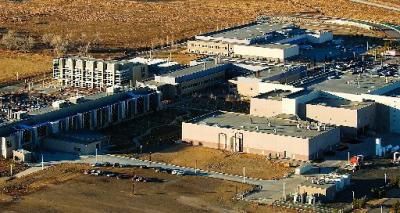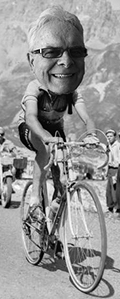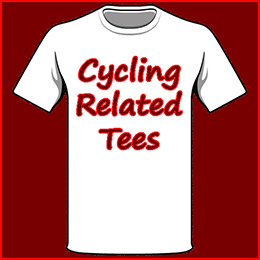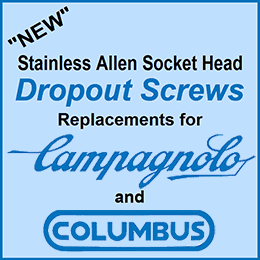Amgen to stop making EPO
 Mon, December 9, 2013
Mon, December 9, 2013  Amgen the company that manufactures Epogen, otherwise known as EPO is to scale down and eventually stop production of the drug over the next twelve months.
Amgen the company that manufactures Epogen, otherwise known as EPO is to scale down and eventually stop production of the drug over the next twelve months.
Epogen is a legitimate medical treatment that increases the red blood cells in patients with certain cancers and kidney disease.
Used illegally by pro cyclists and other athletes, it also increase red blood cells, thereby carrying more oxygen to the muscles, resulting in a huge boost in performance.
I have always found it interesting and fascinating that Amgen sponsors the Tour of California professional bike race each year.
Is this a mere coincidence? At what board meeting did someone suggest that a company that makes medication for very sick people would benefit, and boost sales by sponsoring a professional bike race?
Amgen, based in Longmont, California is shutting down production of Epogen because of a steady decrease in sales over recent years. Figures went from 2.6 billion in 2009, to 2.5 billion in 2010, to 2 billion in 2011. (Note that is Billion with a “B.”) The decline in sales is still falling with current quarterly earnings down 3% on last year’s sales.

I am not speculating as to why Amgen’s sale of Epogen is declining, I am simply asking why? Are there less sick people needing the drug, because that is not how patterns in a population’s health usually go. There may be fluctuations up and down from one year to the next, but not usually a steady decline.
Is it yet another coincidence that sales have declined since 2009, over the same period that professional cycling started to clean up its act? And is it possible that illegal sales of EPO could run into Billions with a “B?”
These are simply questions I am asking. I do not have the time or resources to follow up on this story. But it would be interesting to go into Amgen’s financial records and follow the money trail, and find out where all that Epogen went.
 Dave Moulton | Comments Off |
Dave Moulton | Comments Off |  Comment,
Comment,  Drugs in Sport,
Drugs in Sport,  Opinion
Opinion 


















Reader Comments (12)
Isn't that what investigative journalism is all about ?
It's been well-covered by many sources:
http://www.washingtonpost.com/wp-srv/business/amgen-anemia-drugs/index.html
FWIW, I see no problem with the practice of extracting one's own blood, and reinjecting it as a means to boost red blood cell count and performance. No drugs involved there, I see it as simply using one's own body, like weightlifting. I don't know if harmful side-effects could result from overdoing this though -- what if you pumped, say, a whole gallon of your own blood into yourself?
Essentially, Amgen oversold the medical benefits of EPO. In time, it seems it is not quite the wonder drug it appeared to be so its use has fallen. What the articles fail to mention is that quantity of EPO manufactured and sold over the years greatly exceeded the number of prescribed doses given to patients over the same time. So where did all this extra EPO go? No one is saying but you can guarantee some of it found its way into cyclists. Did Amgen care or try to stop this illicit use? I doubt it.
FWIW, you might not see it as a problem but doping authorities do. Extracting, storage and re-infusing of blood is a complicated business, fraught with dangers if not done properly.
Well it can't have any more danger than your everyday blood bank (less since it's your own blood).
Anyways, "doping" is not a good name for it, as there's no "dope" involved.
Another accepted technique that self-transfusion seems comparable to: high-elevation training, and especially high-altitude simulation chambers.
I was on Epogen for 4 years when I was on dialysis.
Whatever the other business reasons for phasing it out, one of them might be that it was simply superseded by other formulations. For example, I got a kidney transplant from the waiting list at about the time that most dialysis patients were gradually being switched or started on Aranesp, another EPO formulation.
The reason Amgen is phasing out Epogen is more innocuous:
A suit, brought by Connecticut pension funds on behalf of purchasers of Amgen stock, alleged the Thousand Oaks, Calif., company repeatedly reassured investors about the safety of anemia drugs Aranesp and Epogen even as clinical trial data raised concerns that the drugs could harm cancer patients. Amgen's statements led to inflated share prices, the suit alleged.
The FDA has also been involved since 2007:
Epogen, used as an anti-anemia treatment for cancer patients, is one of the drugs an expert Food and Drug Administration panel last week (in 2007) recommended be restricted following the release of negative clinical studies on it and similar drugs.
So Amgen over-sold those two drugs.
Seems EPO has better use in endurance sports than in cancer treatment. They can’t figure a way to keep athletes supplied legally; and there are better drugs for them anyway. Next Amgen will back out of the Amgen Tour of California.
Fewer sick people means less sickness.
English teacher,
Please explain because I thought “Sick people” was a mass noun, therefore less, rather than a count noun, which is fewer. I was also taught, you can’t make a mass noun plural. “Less furniture,” because you can’t say “Furnitures.” By the same rule, is it not “Less sick people,” because you can’t say peoples?
Dave
HUH! 'Are there less SICK people needing the drug? In the case of cycling ? Anyone who feels the need to take ANY drug to succeed, is INDEED SICK, in the bloody head. Once again it's NOT about the drugs, its about GREED The almighty dollar or what ever you get paid in. If people boycott the goods, like TREK Shimano etc. they would soon clean up there act and get rid of athletes who are druggies. L/A must have millions from the company's who sponsored him.
Actually the use of EPO, the overwhelming percentage of which is used for patients on dialysis and with chronic kidney disease and therefore paid for by Medicare, is going down mainly because Medicare reimbursement policies have changed. The criteria for use - that is, how severely anemic one must be to receive the drug and the upper level of anemia at which the drug will no longer be paid for - have been lowered, payment itself has been lowered, and the payment in dialysis units has been "bundled" into the overall payment dialysis facilities receives, so that now it actually costs facilities to provide the drug whereas they used to make a profit by giving it.
This policy change prevents dialysis providers from abusing the system by using more than necessary amounts of the drug to increase their profits but may harm patients by leaving them more anemic and requiring more transfusions. It may be a wise change, or it may not: time will tell. At least there is some logic to it, unlike many other Medicare policies. But it has nothing to do with cycling and very little to do with Amgen as a company. It has everything to do with cutting Medicare costs.
The previous comment regarding the safety of the drug is also part of the issue in that all doctors, but especially oncologists giving the drug to cancer patients, are now ordered by Medicare to inform patients in writing of all of the potential side effects of the drug and hence must be more thoughtful in its administration, although I am not sure that I would accuse Amgen of "overselling" the drug, certainly not in the way Viagra and testosterone are oversold!
As a nephrologist treating patients with kidney disease, I would stress that the side effects of EPO properly used are very rare and that it is a wonderful drug which benefits thousands of very ill patients every day. I do not endorse its use as a PED.
The decline in EPO sales isn't caused by professional cycling. Let's get out the back of an envelope:
There are less than 100 teams at the international level (men and women). They've got less than 30 riders each. So that's a ceiling of 3,000 potential "international professional cyclist" customers.
There are over 170,000 legal users of EPO in the USA alone.
We also know that dopers don't use EPO like patients do. Dopers seek to avoid detection by dosing when there is optimal return for the risk and to not take complete doses but to "micro-dose".
So even with a worst-case "all cyclists in the international peleton are doped to their eyeballs" their EPO use would be small beer for EPO manufacturers.